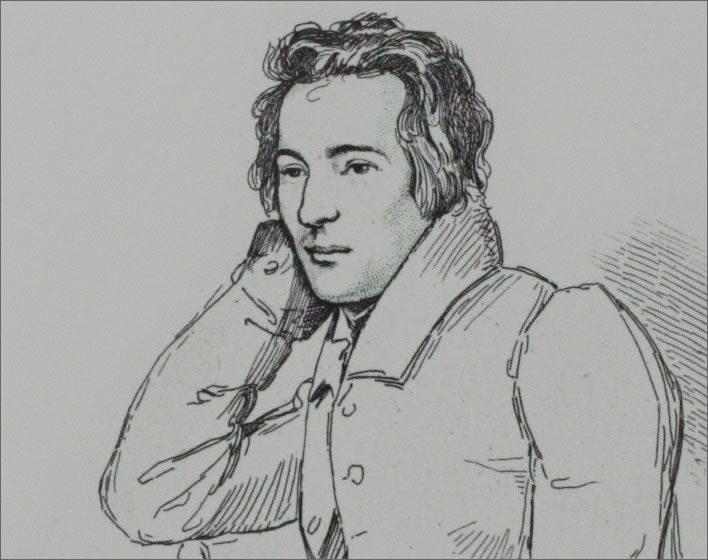Quote for the first day of May
Richard Law, UTC 2019-05-01 10:21
Our quote for the first of May comes not from the dispiritingly grumpy and confused Karl Marx (1818-1883), German Jew turned Protestant, but from his distant cousin half a generation before him, the amusingly angry and ever precise Heinrich Heine (1797-1856), another German Jew turned Protestant.

The 32 year-old Heinrich Heine in an etching by Eduard Mandel (1810-1882) from a drawing by Franz Kugler (1808-1858), 1829. Heinrich-Heine-Institut, Düsseldorf.
His travel journal Die Harzreise, 'The journey to the Harz', describes a journey he undertook in 1824 from Göttingen, where he was a student, to the Harz mountains, notably the fabled hill, the Brocken. When it was published in 1826 it was an immediate publishing success, his first.
Heine is considered to be the writer whose work became the righthand bookend of the Romantic movement in Germany. Our quote for this Mayday taken from the close of Die Harzreise characterises Heine perfectly in one paragraph. Set in Berlin, after his descent from the Harz, he takes the reader from the blossom of the Romantic School to the hard realism of the new metropolitan Germany in one paragraph. No other German writer before him could have written this.
Today is the first of May; like a sea of life the spring washes over the earth, the white blossom hangs on the trees, a distant, warm haze has spread over everything; in the town the windowpanes of the houses are glinting joyfully, on the roofs the sparrows are building their little nests, in the streets people are amazed that the air is so affecting and that they themselves are feeling so happy; the colourfully dressed women from Hamburg are selling bunches of violets; the orphans, with their blue jackets and their lovely, illegitimate faces, cross over the Jungfernstieg and are happy, as though today will be the day they find their father again; the beggar on the bridge looks so happy, as though he has just won the lottery; the sun even shines down with its most tolerant rays on the black, not yet hanged trader, who is approaching with his rascally manufacturer's face – I want to walk out beyond the town gate.
Es ist heute der erste Mai; wie ein Meer des Lebens ergießt sich der Frühling über die Erde, der weiße Blütenschaum bleibt an den Bäumen hängen, ein weiter, warmer Nebelglanz verbreitet sich überall; in der Stadt blitzen freudig die Fensterscheiben der Häuser, an den Dächern bauen die Spatzen wieder ihre Nestchen, auf der Straße wandeln die Leute und wundern sich, daß die Luft so angreifend und ihnen selbst so wunderlich zumute ist; die bunten Vierlanderinnen bringen Veilchensträußer; die Waisenkinder, mit ihren blauen Jäckchen und ihren lieben, unehelichen Gesichtchen, ziehen über den Jungfernstieg und freuen sich, als sollten sie heute einen Vater wiederfinden; der Bettler an der Brücke schaut so vergnügt, als hätte er das Große Los gewonnen; sogar den schwarzen, noch ungehenkten Makler, der dort mit seinem spitzbübischen Manufakturwarengesicht einherläuft, bescheint die Sonne mit ihren tolerantesten Strahlen – ich will hinauswandern vor das Tor.
Online.
Heine and Marx, both hounded by the German authorities, kept in contact, particularly during Heine's extended exile in Paris.
0 Comments UTC Loaded:
Input rules for comments: No HTML, no images. Comments can be nested to a depth of eight. Surround a long quotation with curly braces: {blockquote}. Well-formed URLs will be rendered as links automatically. Do not click on links unless you are confident that they are safe. You have been warned!